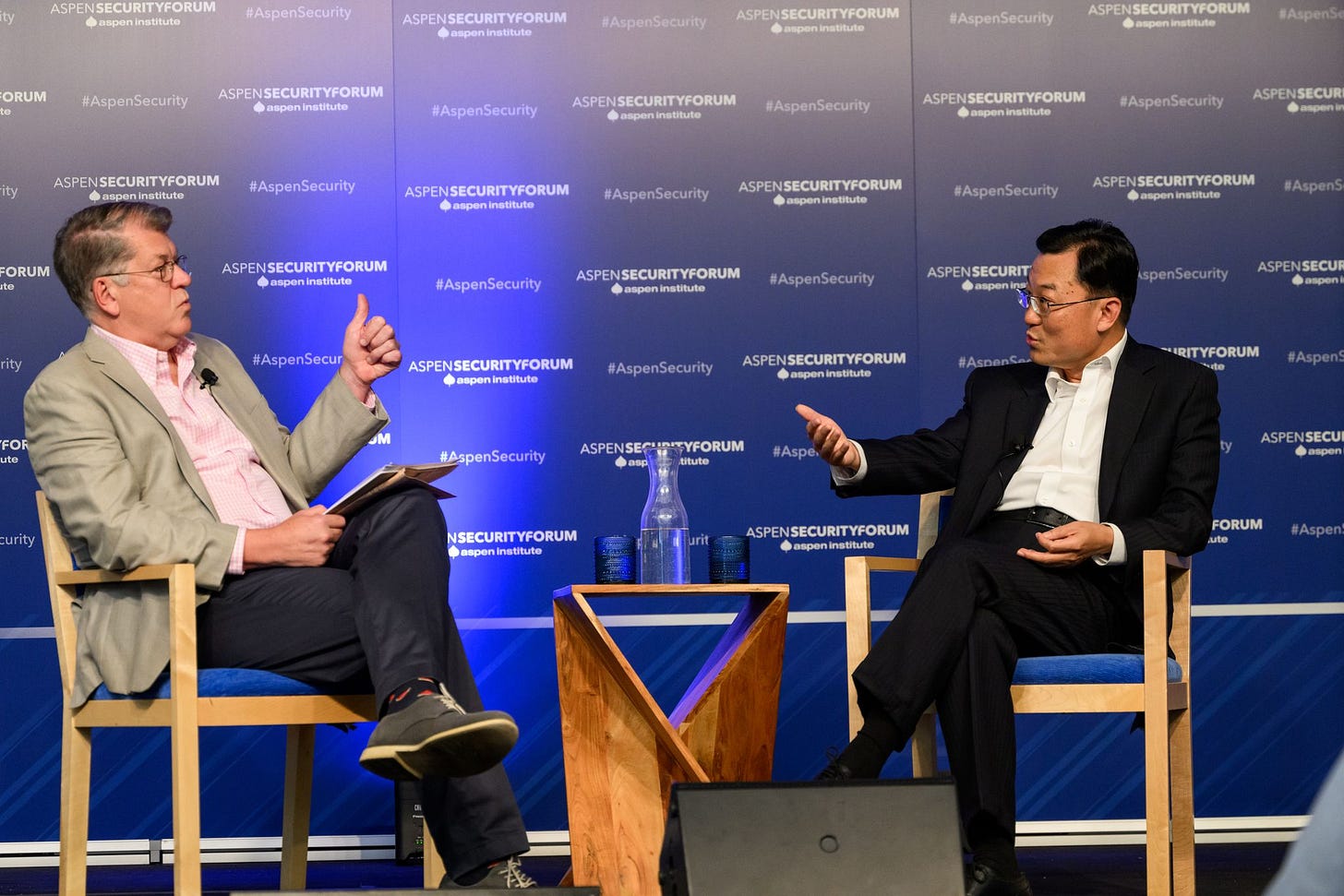Scenes from The Aspen Security Forum
Steve Clemons interviews China’s new US Ambassador Xie Feng (Chris Council / Aspen Security Forum)
I’m at the The Aspen Security Forum this week deep in the Rocky Mountains. This is one of the higher profile foreign policy and international security conferences, alongside annual events like the Munich Security Conference and Halifax International Security Forum. The Aspen Forum tends to attract big players. Linda Thomas-Greenfield, Antony Blinken, CIA Director William Burns, National Security Advisor Jake Sullivan, UK Foreign Secretary James Cleverly, China’s new US Ambassador Xie Feng and many, many more.
For such a high profile gathering, it is a rather intimate affair — a deliberate consequence of the pristine mountain setting. As I type this, the conference is about half over. The big event later today is CIA Director Bill Burns.
As you would expect, competition with China and Russia’s invasion of Ukraine are dominating the discussions. On the former, the new Chinese Ambassador to the US struck a somewhat conciliatory tone in conversation with Semafor’s Steve Clemons. “I once remembered an American friend asked me what kind of flower will grow out of China?” said Ambassador Xie. “And my answer is, it will be a flower of peace, a flower of cooperation, a flower of common in our development. It will be a Chinese peony, as beautiful, as sweet as American roses.”
This was a sharp contrast to last year’s forum, where the previous Ambassador, Qin Gang, was downright adversarial in substance and temperament. (He was since promoted to Foreign Minister, but in recent weeks has been missing from public view, sparking rumors that he may be on the outs with Xi Jinping).
Substantively, Xie offered concrete opportunities he argued could reduce tensions between the US and China — including what I would characterize as low hanging fruit. Here’s an instructive exchange.
Xie Feng: I think there are great a lot of areas that we can cooperate including AI, quantum, whatever. Now, it's a difficult time, so why don't we start with some concrete, small steps, for example, to increase passenger flights, to adjust the China Travel Advisory, to resume and renew the cooperation agreement on science and technology, to restart, the [Mutual Educational and Cultural Exchange Act (MECEA)] program, which will facilitate more Congressmen, Senators, as well as their staff members to visit China. Why don't we hold the tourism leadership forum so as to attract tourists from both countries we visit each other? And last but not least, I think that we should do something to facilitate the visa application as well as the border entry for businessman, for scholars, for students, and for tourists. So these are easy things I think we can do right away.
It’s notable that these remarks come on the heels of several high level visits by American officials to China in recent weeks, including Janet Yellen, Antony Blinken and John Kerry.
Here in Aspen, Xie’s softer tone is a further reaffirmation that tensions with China are — at least for now — somewhat reduced.
As for me, I’m nailing down interviews for the podcast. I just wrapped up a conversation with Joseph Nye about soft power and US-China competition; and yesterday sat down with Kenya’s National Security Advisor Monica Juma to discuss the intersection of climate change and regional security challenges. Later today, I’ll be speaking with Ukrainian human rights lawyer and Nobel Peace Prize laureate Oleksandra Matviichuk. Be sure to follow the podcast to get those episodes as soon as they are released.
Is there a story you’d like me to follow while I’m here? Let me know!
Mark
Mark Leon Goldberg
Editor in Chief, Global Dispatches



